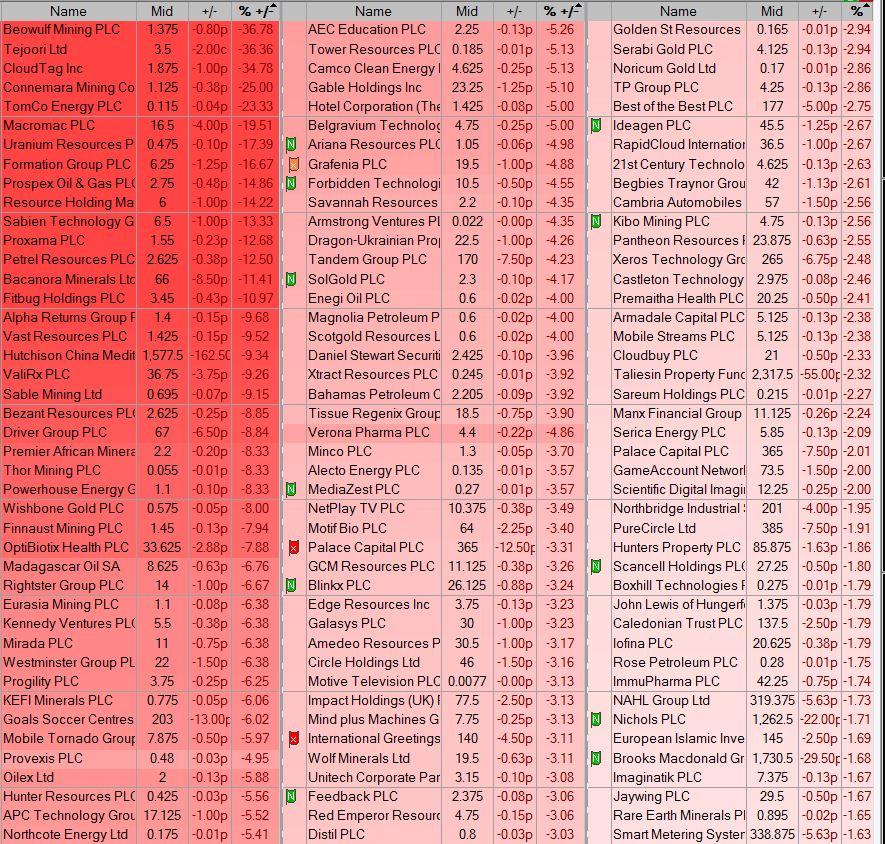This year’s Top 20 Stock Picks include FTSE 100 companies, Investment Trusts, AIM-listed smaller companies and exciting US growth stocks.
Each year, UK Investor Magazine journalists and contributors pick out a selection of share tips catering for a broad range of investment styles, from conservative long-term income strategies to those seeking racier growth plays.
UK Investor Magazine’s Top 20 Stock Picks 2025:
- Murray Income Trust (LON:MUT)
- Rio Tinto (LON:RIO)
- Rigetti Computing (NASDAQ:RGTI)
- Tekcapital (LON:TEK)
- GenIP (LON:GNIP)
- Sweetgreen (NYSE:SG)
- Adsure Services (AQSE:ADS)
- Majestic Corporation (AQSE:MCJ)
- Broadcom (NASDAQ:AVGO)
- Helix Exploration (LON:HEX)
- Vistry (LON:VTY)
- Vietnam Holding (LON:VNH)
- Fulcrum Metals (LON: FMET)
- Earnz (LON:EARN)
- SRT Marine Systems (LON:SRT)
- Team Internet Group (LON:TIG)
- Renold (LON:RNO)
- Gulf Marine Services (LON:GMS)
- JD Sports (LON:JD)
- Petro Matad (LON:MATD)
Murray Income Trust (LON:MUT)
Murray Income Trust’s 4.7% dividend yield isn’t the highest in the equity income space. Yet, consistent dividend growth over the years makes it a solid income choice to tuck away in the core of most income portfolios.
Focused on UK equities with some exposure to overseas stocks, Murray Income Trust counts FTSE 100 stalwarts, including AstraZeneca, Unilever, National Grid and BP, in its top ten holdings.
A close look into the performances of their top ten holdings explains the poor performance of the trust towards the back end of 2024, and this is where the opportunity lies. Indeed, many of the stocks held within the Murray Income Trust could easily have a place in our top stock picks for 2025 on an individual basis.
BP is finding support around the 370p mark and offers a very respectable 6% yield. Diageo trading at 18x historical earnings doesn’t adequately reflect the deep MOAT created by its portfolio of drinks brands. National Grid is investing billions creating a platform for future growth and the transition to net zero – while paying a 6% dividend.
Murray Income is very well placed to capture a recovery in the UK’s biggest income names over the next year as energy markets stabilise and consumers find their feet after years of inflation.
A steady income Investment Trust option for the long-term investor.
Rio Tinto (LON:RIO)
Sentiment surrounding China is on its knees. Efforts to stimulate the economy have been a major disappointment, and investors are concerned authorities are not going far enough to bolster demand.
Iron prices are down over 20% over the past year, and copper has been almost flat despite making a short-lived rally in the middle of 2024.
History dictates the tremendously cyclical mining sector explodes higher on any hint of positivity or anticipation of an improvement in the demand outlook. There are numerous catalysts on the horizon that could spark a rally in the sector in the coming year.
Although measures announced to date have underwhelmed, China is showing signs of fresh thinking when it comes to stimulus. There is also substantial negativity surrounding Trump’s second term, which is largely priced in. Any scenario better than the worst case will be taken well by the markets.
Rio Tinto shares have found support in the 44,000p – 46,000p range on a number of occasions going back to 2021. Shares trading at 48,500p with a forward earnings multiple of 8.6x are compelling.
The cyclical nature of commodities and the follow-through for Rio Tinto’s earnings suggest a rebound before long.
Rigetti Computing (NASDAQ:RGTI)
‘Quantum. Quick’ is Rigetti Computing’s strapline. The quantum computing integrated circuits developer is pushing forward with the rollout of the Novera QPU, Rigetti’s 9-qubit QPU. If quantum computing takes off in 2025, companies like Rigetti that provide the ‘picks and shovels’ hardware will likely be major beneficiaries- especially if the AI playbook is anything to go by. Some are calling Rigetti quantum computing’s Nvidia.
Rigetti Computing has unveiled the Novera QPU, a quantum processing unit that maintains the technical specifications of their larger quantum systems while offering a more compact form factor. The device leverages the company’s Ankaa™-class architecture, developed over a decade of research and development.
The Novera’s design features qubits arranged in a square lattice configuration with tunable couplers, a setup that enables precise control over two-qubit operations. According to Rigetti, this architecture choice allows researchers and developers to conduct advanced quantum computing experiments while maintaining high operational fidelity.
Quantum has many possible applications, including drug discovery, managing financial risks, developing synthetic enzymes and reducing the computational overheads in AI.
Rigetti’s systems are already available through Amazon Web Services and Microsoft’s Azure.
The technology is still in its early stages. However, Rigetti has said it will spend much of 2025 working on launching a 100-qubit computer which would represent a major milestone for the company and the wider industry.
Revenues are modest, and one can expect them to grow as Rigetti upgrades its systems.
Investors interested in quantum computing may also want to consider IonQ (NYSE:IONQ), Quantum Computing Inc (NASDAQ:QUBT) and D-wave Quantum Inc (NASDAQ:QUBT).
The sector has already enjoyed spectacular gains, so tread carefully.
Tekcapital (LON:TEK)
Tekcapital, one of our best-performing picks for 2024, makes it into our top picks for a second year running as the technology investment company readies portfolio company Guident for an IPO.
The IPOs of MicroSalt and GenIP helped crystalise balance sheet value in 2024, and Guident promises further value creation in the year ahead.
Indeed, the autonomous vehicle industry in which Guident operates is heating up as investors pour funds into new listings and startups as companies race to establish a foothold in the autonomous urban mobility market. Guident’s teleoperations service has the potential to play a vital part in the broad rollout of AV technology, particularly in robotaxis, shuttles and surveillance robots.
Underpinning the opportunity for investors, Tekcapital trades at a substantial discount to its net asset value, which is compounded by the opportunity for portfolio companies GenIP, MicroSalt, Guident, Innovative Eyewear and Belluscura to increase in value as their revenues grow.
Operating at the forefront of innovation in autonomous vehicles, smart eyewear, AI, food technology and medical devices, each portfolio company has carved out its own market and is gaining traction. 2025 promises to be a year rich with newsflow.
London needs more companies shooting for the stars like Tekcapital.
GenIP (LON:GNIP)
We recently highlighted GenIP as our pick of London’s AI small caps, and the growth opportunity warrants inclusion in this selection.
GenIP is leading the application of Generative AI to transform how universities commercialise their research discoveries. The company has developed AI models that help Technology Transfer Offices evaluate the market potential of new technologies – a critical capability given that universities can generate substantial revenue by commercialising research, as demonstrated by success stories like Google and Yahoo, which began as university technologies.
The company’s current market capitalisation appears notably modest when compared to broader AI sector valuations. Recent developments in the AI space highlight this disparity: Elon Musk’s xAI raised capital at a 450x revenue multiple, while Anthropic secured Amazon investment at a 40x revenue multiple. Even applying conservative multiples observed in the AI sector, GenIP’s potential valuation could range from £40 million to £450 million based on its current revenue trajectory.
This valuation gap appears even more striking considering GenIP’s substantial market opportunity, with over 4,000 universities in its target market.
Sweetgreen (NYSE:SG)
Americans’ desire to lose weight in the age of TikTok and Instagram was highlighted by the explosion of weight loss drugs in 2024. The drug companies behind the most popular treatments enjoyed sharp increases in their share prices as demand ballooned.
Taking a different approach to this trend, we include Sweetgreen, the ‘mission-driven, next-generation restaurant and lifestyle brand that serves healthy food at scale’, in our top picks for 2025.
The company provides healthy fast food from over 200 stores across the US with low-calorie nutrishous dishes. The company is also big on deliveries. Sweetgreen has established an ‘Outpost’ service that delivers their meals to offices, offering lower fees and personalisation options.
Sweetgreen is building momentum, which looks set to continue into 2025 as explained by the group’s CFO below:
“In the third quarter, we reported a 20.2% restaurant-level margin, a more than 100 basis point improvement from the third quarter of 2023 and marking our 7th consecutive quarter of year-over-year restaurant-level margin expansion. Adjusted EBITDA for the quarter was $6.8 million, up from $2.5 million from the third quarter of 2023. Our year-to-date Adjusted EBITDA of $19.3 million versus a $1 million loss this time last year continues to demonstrate our focus on profitability,” said Mitch Reback, Chief Financial Officer.
“We are encouraged by our performance nine months into the year on both the top and bottom line, which is why we are raising our fiscal year 2024 guidance.”
Adsure Services (AQSE:ADS)
Adsure Services is fast becoming a dividend hero.
The internal audit and business assurance firm recently increased its interim dividend by 60% to 0.786p, bringing total dividends since IPO to 2.266p – representing approximately 11% of the current share price of 20.5p.
Adsure’s dividend growth is supported by recurring cash flows from long-term contracts with government-funded organisations, including NHS trusts, emergency services, local government, and housing associations.
Listed on the Aquis Stock Exchange, Adsure Services has enjoyed strong financial performance since listing in 2023, with the company reporting a 46% surge in gross profits and a 19% revenue increase to £5.1m for the half-year period ending September 30th.
Adding to Adsure’s allure, the company is quietly working on developing AI large language model technology to improve efficiencies for government-funded organisations. This may open up new revenue streams.
Adsure trades at very attractive multiples and deserves a higher valuation.
Majestic Corporation (AQSE:MCJ)
In its ‘Recycling of Critical Minerals: A World Energy Outlook Special Report’ released in late 2024, the International Energy Agency (IEA) said:
“Recycling is indispensable to the security and sustainability of critical minerals supply for clean energy transitions. While recycling does not eliminate the need for mining investment, it creates a valuable secondary supply source that reduces reliance on new mines and enhances supply security for countries importing minerals. Moreover, scaling up recycling mitigates the environmental and social impacts related to mining and refining while preventing waste from end-use technologies ending up in landfills.”
Enter Majestic Corporation.
Another Aquis-listed company generating substantial revenues and robust profits, Majestic Corporation is at the forefront of e-waste recycling and is playing a significant part in the circular economy by returning critical minerals, including copper, lithium, cobalt and platinum, to the supply chain.
Revenues nearly doubled to $25m in the half-year period, driven by the expansion of operations in the UK, as well as notable increases in battery metal and solar panel recycling.
While Majestic’s ESG credentials are exemplary, the company is laser-focused on financial performance, as demonstrated by a sterling set of half-year results.
Everything points to further growth in 2025.
Broadcom (NASDAQ:AVGO)
Chipmakers such as Nvidia have led the first wave of the AI stock market rally. The big question is whether AI applications or AI infrastructure will form the second wave.
For those betting on AI infrastructure, Broadcom is a solid option. AI infrastructure concerns the complex systems that connect chips and CPUs made by companies such as Nvidia and Broadcom themselves.
Building on its deep knowledge of building complex and powerful systems for companies like Google, Broadcom announced plans for 1 million CPU hyperscale clusters to be launched in 2027 to meet the AI demands of the world’s biggest AI players, including Amazon, Meta and Microsoft. Broadcom is emerging as the leader in complex, large-scale AI architecture, and shares are reacting accordingly.
Broadcom isn’t just an infrastructure play; it generates billions in revenue from chips and expects this to increase in the future. Indeed, Broadcom is working closely with Apple to develop a chip specifically for AI.
Helix Exploration (LON:HEX)
London has developed a peculiar passion for helium explorers, and we’d be amiss if we did not include one in our top stocks for 2025.
While the rest of the world has been caught up in the AI frenzy, UK small-cap investors have been piling into helium plays. Sanctions on Russia have disrupted the global supply of helium, creating a potential opportunity for new players to step into the fray and fill the gap.
Helix Exploration is one such company.
Helix Exploration has established a significant presence in the ‘Montana Helium Fairway’ with two major assets under its portfolio. The company, established by seasoned US helium industry professionals, holds 52 leases across the Ingomar Dome, an extensive 16,512-acre structure.
This primary asset boasts a P50 unrisked gross prospective helium resource of 2.3 billion cubic feet, with a potential upside reaching 6.7 billion cubic feet. Previous drilling operations have confirmed the presence of gas across all target reservoir zones within the structure.
Helix should be considered a high-risk investment, like most natural resources explorers. There is no guarantee any of the assets will make it through to production and, like most explorers, the company may also require funds in the future if it is to further develop its asset base.
Should the helium hype continue into 2025, one would expect Helix to benefit.
Vistry (LON:VTY)
Profit warnings tend to come in threes, and Vistry’s trading update released on Christmas Eve slashing profit before tax guidance for the year to £250m wrapped up a woeful year for the group.
There is still a relative amount of risk attached to Vistry and the company could well release further bad news early in 2025.
Looking past the dismal news, the company has lost close to two-thirds of its value from 2024 peaks, and the market appears to be taking a ‘sell now, ask questions later’ approach to the stock.
The lowered guidance of profit before tax of £250m and expectation of net debt of £200m was a real kick in the teeth for investors, but the fundamentals that support growth in the coming years remain intact.
Vistry has established a partnership model focusing on affordable and social housing, which will be integral in getting anywhere near Labour’s 1.5m new homes target.
2025 will likely be a bumpy ride that sees Vistry shares close the year higher than they started.
Vietnam Holding (LON:VNH)
Another of our 2024 picks making the cut for the second year running is the Vietnam Holding Investment Trust.
The underlying investment case for Vietnam and Vietnam Holding has enhanced during 2024 as the economy continues to expand and become increasingly digitalized, with major technology companies such as Nvidia investing in the country.
Geopolitics are playing into Vietnam’s hands, and the country enjoyed record trade last year, which is likely to continue into 2025.
Vietnam Holding has been the best-performing Vietnam-focused Investment Trust, recognised by several awards, including ‘Best emerging market single-country fund’ by Citywire and the ‘Best Single Country Investment Company’ by Investment Week.
A major attraction of Vietnam Holding is the eventual promotion of Vietnam to emerging market status and the associated capital flows into the Vietnamese stocks held in the portfolio.
Fulcrum Metals (LON: FMET)
AIM-quoted Fulcrum Metals is refocusing from a uranium and gold exploration operation into a tailings processing business. It retains interests in uranium and gold, but the direct investment will be in building up a tailings business in Canada using technology developed by Extrakt, a specialist mining technology developer.
Extrakt uses separation technology to extract metals from tailings without the use of cyanide. The local government and the population appear to be supportive of the use of technology to clear up the large number of tailings sites, which have a significant potential long-term cost of dealing with them.
Fulcrum Metals has options over the Teck-Hughes and Sylvanite tailings projects and phased development programmes have been agreed with Extrakt. The initial testing suggests a reduction in leach times of up to 94%. At Sylvanite there was an increase in gold recoveries from 30% to 49%. The process can still be optimised.
Fulcrum is in discussions with Extrakt for an exclusive licence to the gold leaching technology. Non-binding terms have been agreed for exclusivity of the technology for the legacy mine waste sites for the Timmins and Kirkland Lake mining areas in Ontario.
Even if the agreement is only for these areas there is significant potential for generating revenues and they could start in the near-term. Over the next 12 months there should be further news concerning progress. The share price, at 7.75p, is yet to reflect the potential but it should gain momentum from positive news.
Earnz (LON:EARN)
Take a look at the share price chart for this company and you would be forgiven if you thought it was a total ‘yawn’ – but 2025 could change all that massively.
Earlier this year, seasoned market operator Bob Holt took control of this company, which is now a ‘cash shell’ that is seeking acquisitions in the energy services sector.
In fact, a number of such possibilities are now underway, which could help to totally change the face and direction of the £5.67m-capitalised company and its 5.55p share price.
Holt has a number of market successes notched on his corporate belt – including Mears Group, his most notable score, taking it from a £9m revenue to over £1bn in 16 years.
I am totally convinced that Holt is going to be one of the 2025 ‘shakers’ and Earnz shareholders will enjoy the profitable ride.
SRT Marine Systems (LON:SRT)
The shares of this £104m- capitalised technologically advanced group have seen a massive swing in price from 43p this time last year, down to 10.35p in May and then up to 50p last month, before settling back to the current 42p.
The group is an established leader in the growing global market for maritime domain awareness, providing technology-driven solutions for coastal and EEZ surveillance, fisheries management and monitoring and navigation safety and efficiency.
Its customers range from government agencies such as Coast Guards, Fishery Authorities and Ports & Waterway authorities to commercial and leisure vessel owners.
Its current Order Book is growing at quite apace and I do believe that 2025 will prove to be ‘a winning year’ for the business.
I am anticipating broker’s upgrading estimates for the current and next year, perhaps around the AGM on Thursday 23rd January.
A move above 60p is my first price aim, while sensing that it would only take a string of good news items to see them break the 100p barrier.
This group looks even more attractive after the Christmas Eve £215m bid for Windward.
Team Internet Group (LON:TIG)
This £233m company, as far as its share price is concerned, has been classed as ‘one of the dogs of 2024’ and that is true.
Suggestions of ‘insider trading’ and a dealings inquiry have circulated, together with comments about the total £1.5m pa earnings being paid to the CEO and CFO for an unsatisfactory year’s business, as well as a badly handled buyback scheme.
That all had a disastrous effect on the group’s share price, which had topped out at 207.50p in late January this year, before falling back to a low of 76p in late November.
However, it is possible that investment professionals have whispered to the CEO to reduce his ‘photo opportunities’ as he flies around the world for various trade events.
I have been a fan of this global internet ‘money machine’ for years and I still like its business model, so if certain exuberances can be curtailed and the business is able to get back onto a growth path again, then I do feel that its shares could well see a useful price recovery in 2025, taking them back up from 93p to 135p in fairly smart order.
Every ‘dog’ can have its day!
Renold (LON:RNO)
Renold is a global leader in the manufacture of industrial chains, it also manufactures a range of torque transmission products which are sold throughout the world to a broad range of original equipment manufacturers, distributors and end-users.
Its products are used in a wide variety of industries including manufacturing, transportation, energy, metals and mining.
Jupiter Fund Management increased their holding in the group to 11.13% of its equity, apparently not at all put off by the recent fall-back in price from the 64p peak in July to the current 47.25p.
This cracking £95m-capitalised business should make a 9.3% turn on its expected £253m sales this year to end-March 2025, worth 7.5p per share in earnings, with brokers looking for 86p as their Price Objective.
Gulf Marine Services (LON:GMS)
Just a week ago this £169m group advised the market that its 2024 and 2025 results should be better than expectations.
Set up in Abu Dhabi in 1977, it has subsequently become a world-leading provider of advanced self-propelled self-elevating support vessels.
Its fleet of 13 vessels serves the offshore energy industries from its offices in the United Arab Emirates, Saudi Arabia, and Qatar, they are capable of serving clients’ requirements across the globe, including those in the Middle East, South East Asia, West Africa, North America, the Gulf of Mexico, and Europe.
For the year to the end of this month, the group could see $168.4m sales, and adjusted pre-tax profits of $43.6m, worth 3.3c per share in earnings.
Next year, that could be $176.4m revenues, $55.0m profits and 4.3c per share in earnings.
The shares, which are now 15.90p, have been valued at 30p by brokers, thereby offering massive upside in price.
JD Sports (LON:JD)
JD Sports is a cyclical bet on continued expansion in the United States and Europe. The company has been dogged by its close ties with Nike and slow trade in the UK, leading to a series of profit warnings in 2024.
It would be premature to proclaim JD Sports’ problems are entirely behind them. That said, the group’s expansion into North America should underpin top-line growth in the coming years, once economic uncertainties are put to bed.
Despite JD Sports saying they saw profit before tax at the lower end of their guidance range of £955m to £1,035m for the full year, the group still offers deep value beneath 100p and a forward earnings multiple of around 7x.
The poor end to 2024 for JD Sports shares has left the company trading in an attractive range that warrants inclusion in this selection.
Petro Matad (LON:MATD)
Petro Matad should be valued at more than £20m. After over a decade of delays, red tape and political wrangling in Mongolia, the company finally began production at its Heron-1 well in the Block XX field in late 2024.
True to form, Petro Matad has faced fresh hold-ups since the start of production, and shares have fallen as a result.
Petro Matad’s Block XX has 194 million barrels of oil (MMbo) resource estimated in place, of which an estimated 33 MMbo to >60 MMbo is recoverable.
Delays can’t erode the long-term value of Petro Matad’s resources, but they can present an opportunity to investors prepared to accept the higher risk of early-stage resource stocks.










